高中英语词汇学习困难成因与应对策略
浅谈高中生英语词汇学习存在困难及其对策
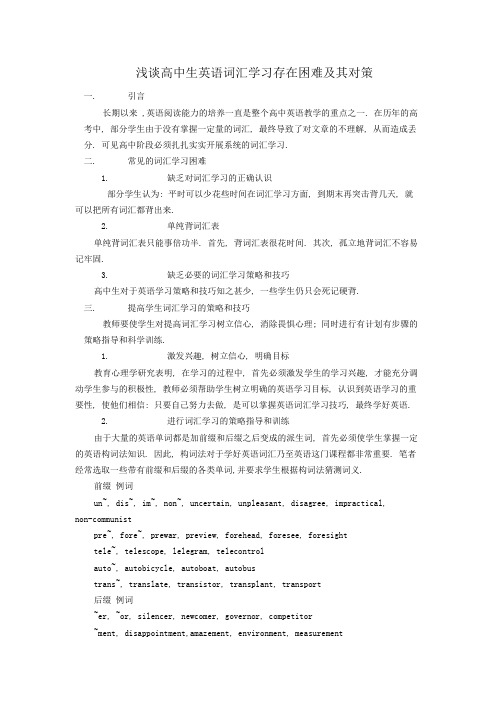
浅谈高中生英语词汇学习存在困难及其对策一. 引言长期以来 ,英语阅读能力的培养一直是整个高中英语教学的重点之一. 在历年的高考中, 部分学生由于没有掌握一定量的词汇, 最终导致了对文章的不理解, 从而造成丢分. 可见高中阶段必须扎扎实实开展系统的词汇学习.二. 常见的词汇学习困难1. 缺乏对词汇学习的正确认识部分学生认为: 平时可以少花些时间在词汇学习方面, 到期末再突击背几天, 就可以把所有词汇都背出来.2. 单纯背词汇表单纯背词汇表只能事倍功半. 首先, 背词汇表很花时间. 其次, 孤立地背词汇不容易记牢固.3. 缺乏必要的词汇学习策略和技巧高中生对于英语学习策略和技巧知之甚少, 一些学生仍只会死记硬背.三. 提高学生词汇学习的策略和技巧教师要使学生对提高词汇学习树立信心, 消除畏惧心理; 同时进行有计划有步骤的策略指导和科学训练.1. 激发兴趣, 树立信心, 明确目标教育心理学研究表明, 在学习的过程中, 首先必须激发学生的学习兴趣, 才能充分调动学生参与的积极性, 教师必须帮助学生树立明确的英语学习目标, 认识到英语学习的重要性, 使他们相信: 只要自己努力去做, 是可以掌握英语词汇学习技巧, 最终学好英语.2. 进行词汇学习的策略指导和训练由于大量的英语单词都是加前缀和后缀之后变成的派生词, 首先必须使学生掌握一定的英语构词法知识. 因此, 构词法对于学好英语词汇乃至英语这门课程都非常重要. 笔者经常选取一些带有前缀和后缀的各类单词,并要求学生根据构词法猜测词义.前缀例词un~, dis~, im~, non~, uncertain, unpleasant, disagree, impractical,non-communistpre~, fore~, prewar, preview, forehead, foresee, foresighttele~, telescope, lelegram, telecontrolauto~, autobicycle, autoboat, autobustrans~, translate, transistor, transplant, transport后缀例词~er, ~or, silencer, newcomer, governor, competitor~ment, disappointment,amazement, environment, measurement~ful, ~less, boxful, mouthful, homeless, priceless~en, ~ify, sharpen, strengthen, terrify, satisfy, simplify~ish, childish, feverish, selfish, greenish其次, 我还经常培养学生利用联想增强对同类词的学习效果. 比如学到furniture, 就可以联想到以前学过的各种家具, 如: washbasin, sofa, cupboard, dressing table, etc.3. 突破词汇限制, 实现语篇理解我国著名的英语学教授李观仪先生说过:”我不主张背单词表, 而且应该通过阅读各种文章来扩大词汇量和正确认识词汇的应用.”教师必须要求学生突破词汇的限制,使学生根据上下文来加深对词汇的理解. 为此, 我便要求学生除了掌握该单词的最常用意思外,还要求他们尽力去联想到它的其它几种意思, 从而巩固以前学过的东西, 做到温故而知新.同时, 学生可以利用上下文中的同义词或近义词以及词与词之间的搭配来猜测词义. 比如在”Let’s synchronize our watch so that we can start game at the same time.”这句话中, synchronize 这个单词学生肯定不熟悉, 但是, 假如学生根据上下文, “能同时开始做游戏”,就可以很轻易地判断出这是”核对时间”的意思.四. 词汇学习应避免的几个误区1. 过分注重技巧, 生搬硬套部分学生自认为已掌握了一定词汇学习的策略和技巧, 便每次都想用这些来帮助自己学习词汇, 其实, 对于具体语言环境中的生词, 我们必须采取灵活多样的学习方式, 决不能把思维束缚在某一点上, 而导致出错.2. 盲目自大, 忽视积累一些成绩较好的学生, 在学习了词汇学习策略和技巧后, 就认为不用再多花时间在记单词上. 但是, 词汇学习除了一定的技巧外, 还要学生不停地花时间去阅读课外文章, 积累词汇, 学生只有在不断的积累中, 才能加深对词汇的记忆效果. 如果学生固步自封, 不思进取, 最终只能走进只注重技巧, 不注重积累的华而不实的”死胡同”五. 结束语本文就中学生词汇学习困难作了初步探讨, 运用良好的学习策略对提高英语学习效果有着直接的影响. 笔者认为, 要有效提高中学生的词汇学习能力, 首先必须了解学生的困难, 针对学生的实际来设计训练方案, 重视学法方面的指导; 同时不断调整训练方案. 这样, 学生的词汇能力就一定能不断地提高, 相应地, 学生的英语阅读理解能力必将会一个新台阶.。
高中学生英语学习的主要困难与解决方法

高中学生英语学习的主要困难与解决方法高中学生在英语学习中会面临许多困难,这些困难可能会阻碍他们的语言学习和提高英语水平的能力。
在本文中,我将探讨高中学生英语学习的主要困难,并提供一些解决这些困难的方法。
1.词汇量不足:高中学生在英语学习中常常遇到词汇量不足的问题。
这会影响他们的阅读理解能力和写作能力。
解决这个问题的方法是多读英语原版书籍和文章,并在读的过程中有意识地积累词汇。
学生可以使用词汇卡片或词汇本来记录和复习生词,并进行记忆和操练。
2.听力理解困难:听力是英语学习中的重要能力之一、然而,高中学生常常面临听力理解困难的问题。
为了提高听力理解能力,学生可以多听英语录音材料,如新闻、电视节目、英语播客等。
同时,学生可以做听力练习题,以提高对不同口音和语速的适应能力。
3.语法应用困难:语法是英语学习的基础,但高中学生常常在语法应用上遇到困难。
解决这个问题的方法是通过大量阅读和听力练习来提高语法应用能力。
同时,学生可以参考语法书籍或参加相应的语法课程,增强对语法规则的理解和掌握。
4.口语表达不流利:口语是英语学习中的重要能力之一,但高中学生常常在口语表达上不流利。
为了提高口语能力,学生可以多参与英语口语活动,如英语角、辩论赛等。
此外,学生可以找语言伙伴进行口语练习,通过模仿和对话来提高口语表达能力。
5.缺乏写作能力:高中阶段的英语学习需要学生具备一定的写作能力,但许多学生缺乏写作实践和经验。
为了提高写作能力,学生可以多写英语作文,通过多次修改和操练来提高文章的质量。
同时,学生可以参考范文和写作指导书籍,学习不同类型文章的结构和写作技巧。
6.缺乏学习动力:高中学生在英语学习中常常面临缺乏学习动力的问题。
为了激发学生的学习兴趣,教师和家长可以提供多样化、有趣的学习材料和活动,如英语游戏、英语电影等。
同时,学生可以设定具体的学习目标,并制定合理的学习计划,以保持对英语学习的兴趣和动力。
总之,高中学生在英语学习中可能会面临词汇量不足、听力理解困难、语法应用困难、口语表达不流利、缺乏写作能力和缺乏学习动力等问题。
高中生英语学习的主要困难与解决方法
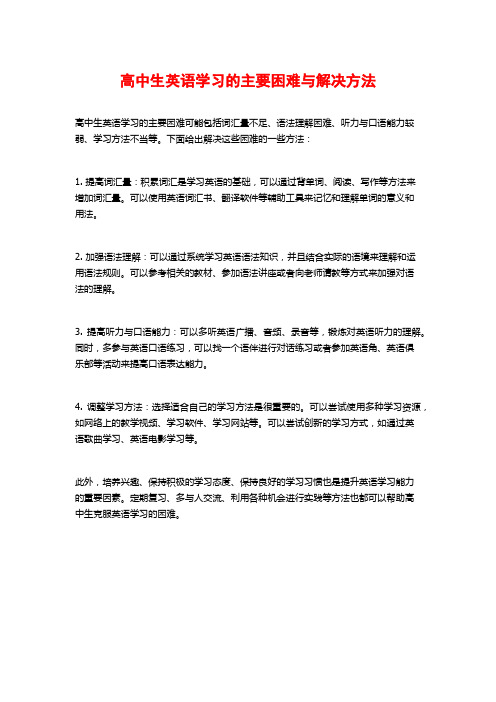
高中生英语学习的主要困难与解决方法
高中生英语学习的主要困难可能包括词汇量不足、语法理解困难、听力与口语能力较弱、学习方法不当等。
下面给出解决这些困难的一些方法:
1. 提高词汇量:积累词汇是学习英语的基础,可以通过背单词、阅读、写作等方法来
增加词汇量。
可以使用英语词汇书、翻译软件等辅助工具来记忆和理解单词的意义和
用法。
2. 加强语法理解:可以通过系统学习英语语法知识,并且结合实际的语境来理解和运
用语法规则。
可以参考相关的教材、参加语法讲座或者向老师请教等方式来加强对语
法的理解。
3. 提高听力与口语能力:可以多听英语广播、音频、录音等,锻炼对英语听力的理解。
同时,多参与英语口语练习,可以找一个语伴进行对话练习或者参加英语角、英语俱
乐部等活动来提高口语表达能力。
4. 调整学习方法:选择适合自己的学习方法是很重要的。
可以尝试使用多种学习资源,如网络上的教学视频、学习软件、学习网站等。
可以尝试创新的学习方式,如通过英
语歌曲学习、英语电影学习等。
此外,培养兴趣、保持积极的学习态度、保持良好的学习习惯也是提升英语学习能力
的重要因素。
定期复习、多与人交流、利用各种机会进行实践等方法也都可以帮助高
中生克服英语学习的困难。
高中生英语学习困难及对策探究

高中生英语学习困难及对策探究高中生阶段是英语学习的重要阶段,但也是学习困难的阶段。
在这个阶段,面对更加深入和复杂的英语知识,许多学生都会面临各种学习困难。
本文将探究高中生英语学习困难的原因,并提出相应的对策,以帮助学生有效地解决这些问题。
一、困难原因1. 基础薄弱许多高中生在初中阶段并没有打好英语基础,导致他们在高中学习阶段面对更加复杂的英语内容时出现困难。
这样的基础薄弱问题是很多学生英语学习困难的根本原因。
2. 学习方法不正确许多学生对于英语学习方法并不了解,导致其学习效果不佳。
有些学生习惯死记硬背单词和语法规则,而忽略了实际运用和语言交际能力的培养。
3. 缺乏学习兴趣对于一些学生来说,他们对于英语学习缺乏兴趣,导致学习动力不足。
这样的学生往往无法主动地进行英语学习,从而产生学习困难。
4. 缺少练习机会英语是一门需要不断练习的语言。
但是在学校教学之外,许多学生很少有机会进行英语听说读写的练习,导致他们的语言能力得不到有效的提高。
二、对策探究1. 加强基础训练学校应该加强对于高中生的英语基础训练,帮助他们夯实基础,打好扎实的语言基础。
学生也应该在课下加强基础知识的复习和巩固,以确保基础不会成为学习困难的障碍。
2. 正确学习方法学校和老师应该引导学生正确的学习方法,注重语言真实运用和语言交际能力的培养,而不是简单的死记硬背。
学生也应该自己多尝试各种学习方法,找到适合自己的学习方式。
3. 提高兴趣学校和老师可以通过多样化的英语教学方式,引导学生对英语产生兴趣。
可以通过英语歌曲、影视剧等形式,让学生感受到英语的魅力。
学生也应该自觉地培养对英语学习的兴趣,多阅读英语文学作品,多参与英语角等活动。
4. 创造练习机会学校应该创造更多的英语练习机会,开设英语角、组织英语演讲比赛等活动,让学生有更多的机会进行英语实际运用。
学生也可以通过互联网、英语角等途径主动寻找练习机会,提高自己的语言能力。
高中生英语学习困难是一个较为普遍的问题,但是只要学生和学校齐心协力,采取有效对策,就能够有效地克服这些困难,提高英语学习效果。
高中学生英语词汇学习困难及对策5篇
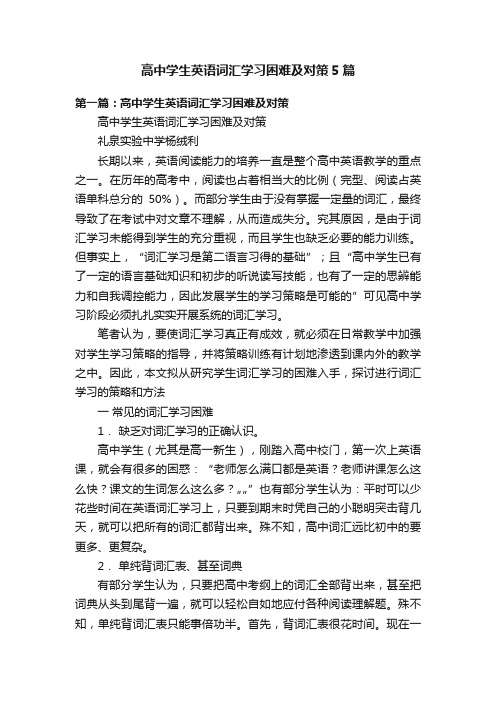
高中学生英语词汇学习困难及对策5篇第一篇:高中学生英语词汇学习困难及对策高中学生英语词汇学习困难及对策礼泉实验中学杨绒利长期以来,英语阅读能力的培养一直是整个高中英语教学的重点之一。
在历年的高考中,阅读也占着相当大的比例(完型、阅读占英语单科总分的50%)。
而部分学生由于没有掌握一定量的词汇,最终导致了在考试中对文章不理解,从而造成失分。
究其原因,是由于词汇学习未能得到学生的充分重视,而且学生也缺乏必要的能力训练。
但事实上,“词汇学习是第二语言习得的基础”;且“高中学生已有了一定的语言基础知识和初步的听说读写技能,也有了一定的思辨能力和自我调控能力,因此发展学生的学习策略是可能的”可见高中学习阶段必须扎扎实实开展系统的词汇学习。
笔者认为,要使词汇学习真正有成效,就必须在日常教学中加强对学生学习策略的指导,并将策略训练有计划地渗透到课内外的教学之中。
因此,本文拟从研究学生词汇学习的困难入手,探讨进行词汇学习的策略和方法一常见的词汇学习困难1.缺乏对词汇学习的正确认识。
高中学生(尤其是高一新生),刚踏入高中校门,第一次上英语课,就会有很多的困惑:“老师怎么满口都是英语?老师讲课怎么这么快?课文的生词怎么这么多?……”也有部分学生认为:平时可以少花些时间在英语词汇学习上,只要到期末时凭自己的小聪明突击背几天,就可以把所有的词汇都背出来。
殊不知,高中词汇远比初中的要更多、更复杂。
2.单纯背词汇表、甚至词典有部分学生认为,只要把高中考纲上的词汇全部背出来,甚至把词典从头到尾背一遍,就可以轻松自如地应付各种阅读理解题。
殊不知,单纯背词汇表只能事倍功半。
首先,背词汇表很花时间。
现在一名高中学生除了学习英语外,还要完成语文、数学、物理、化学等大量作业。
因此,客观上不允许学生把大量的时间花在背词汇表上;其次,单纯、孤立地背词汇不容易记牢。
德国心理学家艾宾浩斯的遗忘曲线表明:遗忘速度起初很迅速;而后,随着时间的推移而逐渐变慢。
浅析高中学生英语词汇学习困难及其策略
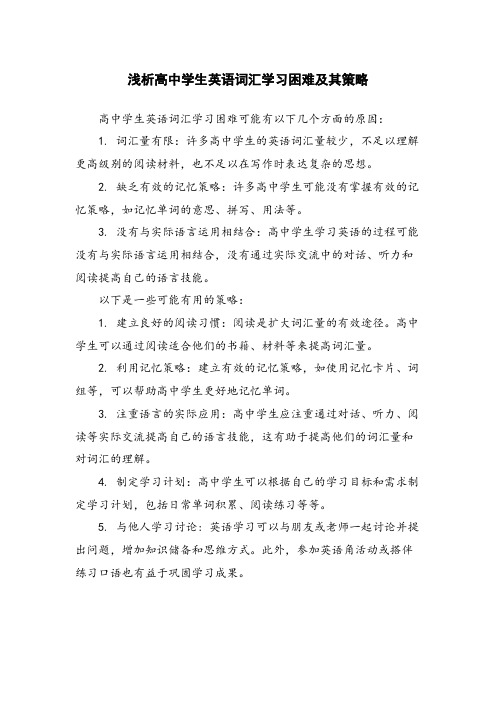
浅析高中学生英语词汇学习困难及其策略
高中学生英语词汇学习困难可能有以下几个方面的原因:
1. 词汇量有限:许多高中学生的英语词汇量较少,不足以理解更高级别的阅读材料,也不足以在写作时表达复杂的思想。
2. 缺乏有效的记忆策略:许多高中学生可能没有掌握有效的记忆策略,如记忆单词的意思、拼写、用法等。
3. 没有与实际语言运用相结合:高中学生学习英语的过程可能没有与实际语言运用相结合,没有通过实际交流中的对话、听力和阅读提高自己的语言技能。
以下是一些可能有用的策略:
1. 建立良好的阅读习惯:阅读是扩大词汇量的有效途径。
高中学生可以通过阅读适合他们的书籍、材料等来提高词汇量。
2. 利用记忆策略:建立有效的记忆策略,如使用记忆卡片、词组等,可以帮助高中学生更好地记忆单词。
3. 注重语言的实际应用:高中学生应注重通过对话、听力、阅读等实际交流提高自己的语言技能,这有助于提高他们的词汇量和对词汇的理解。
4. 制定学习计划:高中学生可以根据自己的学习目标和需求制定学习计划,包括日常单词积累、阅读练习等等。
5. 与他人学习讨论: 英语学习可以与朋友或老师一起讨论并提出问题,增加知识储备和思维方式。
此外,参加英语角活动或搭伴练习口语也有益于巩固学习成果。
自学英文单词的高中生常见问题及解决
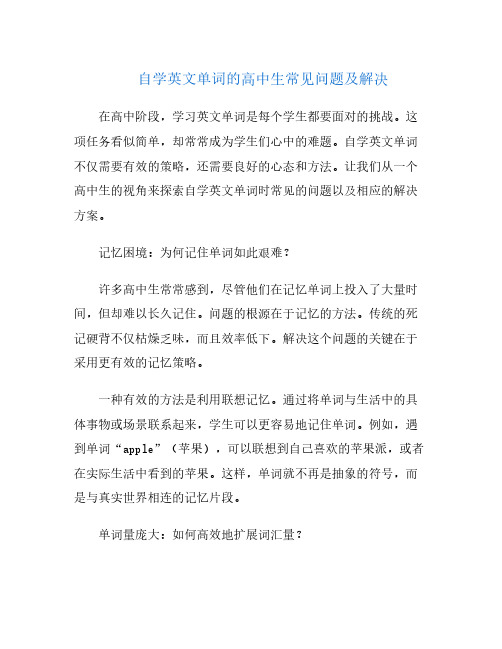
自学英文单词的高中生常见问题及解决在高中阶段,学习英文单词是每个学生都要面对的挑战。
这项任务看似简单,却常常成为学生们心中的难题。
自学英文单词不仅需要有效的策略,还需要良好的心态和方法。
让我们从一个高中生的视角来探索自学英文单词时常见的问题以及相应的解决方案。
记忆困境:为何记住单词如此艰难?许多高中生常常感到,尽管他们在记忆单词上投入了大量时间,但却难以长久记住。
问题的根源在于记忆的方法。
传统的死记硬背不仅枯燥乏味,而且效率低下。
解决这个问题的关键在于采用更有效的记忆策略。
一种有效的方法是利用联想记忆。
通过将单词与生活中的具体事物或场景联系起来,学生可以更容易地记住单词。
例如,遇到单词“apple”(苹果),可以联想到自己喜欢的苹果派,或者在实际生活中看到的苹果。
这样,单词就不再是抽象的符号,而是与真实世界相连的记忆片段。
单词量庞大:如何高效地扩展词汇量?当面对庞大的单词量时,许多学生会感到不知从何入手。
有效的单词学习策略是将词汇学习融入日常生活中,而不是单纯依赖于记忆卡片或课本。
可以使用词汇表或词汇书,将新学的单词与已有的词汇进行比较,理解它们之间的关系。
此外,设置每天学习一定数量的单词目标,并通过复习和运用加深记忆,是扩展词汇量的有效途径。
缺乏上下文:如何提高词汇的实际运用能力?单词的实际运用是学习的核心,但许多学生发现,他们能记住单词,但在实际运用中却感到困难。
这通常是因为学生在学习单词时缺乏上下文的支持。
为了提高单词的实际运用能力,学生应当在学习单词时尽量将其放在具体的句子或短文中进行练习。
通过阅读英语文章、听英语广播、观看英文电影等方式,可以帮助学生更好地理解和运用新学的单词。
发音困难:如何正确发音单词?发音是另一个困扰许多学生的问题。
由于自学的过程缺乏老师的指导,学生常常不知道如何准确地发音。
解决这一问题的一种方法是借助发音工具或应用程序,这些工具通常提供单词的标准发音,并允许用户反复听取。
高中生英语学习中常见的困难及应对策略

高中生英语学习中常见的困难及应对策略在高中生英语学习过程中,常常面临各种挑战和困难。
这些困难不仅仅是语法和词汇的学习,还涉及到文化背景的理解和语言运用的实际应用。
以下是一些高中生在英语学习中常见的困难及相应的应对策略:首先,语法对许多学生来说是一个艰难的障碍。
它就像一座复杂的迷宫,让学生们感到困惑和挫败。
解决这一困难的关键在于建立坚实的基础。
就像学习一门新的游戏一样,从简单的规则开始,逐步深入。
学生们可以通过频繁的练习和针对性的指导,逐步提升对语法规则的理解和掌握。
其次,听力理解也是一个普遍存在的问题。
有时,快速的英语发音和口音差异会让学生感到困惑,导致他们难以准确理解语言内容。
应对这一挑战的方法是多听多练。
通过听英语广播、观看英语电影或者参加英语听力训练班,学生们可以逐渐提高他们的听力水平,增强对不同口音和语速的适应能力。
另外,词汇量的积累也是学习英语过程中的一大挑战。
对于许多学生来说,记忆单词是一项乏味且具有挑战性的任务。
为了克服这一难题,学生们可以采用多种学习策略,如制作单词卡片、利用手机应用程序进行单词记忆,或者通过阅读英语书籍和文章来增加词汇量。
这些方法不仅能够帮助学生们扩展词汇量,还能够提升他们的语言表达能力和阅读理解能力。
此外,文化差异也是学习英语时常见的障碍。
理解和运用英语不仅仅是学习语言本身,还包括了背后的文化背景和语境。
学生们可以通过积极参与国际交流活动、阅读相关的文化资料和与外国朋友交流来增进对英语文化的理解。
这样做不仅能够帮助学生们更好地理解和运用英语,还能够拓展他们的视野,增强跨文化交流的能力。
最后,写作技能的提升也是学习英语过程中的一个重要目标和挑战。
许多学生在表达思想和观点时遇到困难,不知道如何组织语言和结构文章。
应对这一挑战的有效方法是多写多练。
通过写作练习、模仿优秀范文和接受教师的指导,学生们可以逐步提高他们的写作技能,增强表达能力和逻辑思维能力。
总之,高中生在英语学习中面对的困难是多方面的,但通过科学合理的学习策略和持之以恒的努力,这些困难是可以克服的。
- 1、下载文档前请自行甄别文档内容的完整性,平台不提供额外的编辑、内容补充、找答案等附加服务。
- 2、"仅部分预览"的文档,不可在线预览部分如存在完整性等问题,可反馈申请退款(可完整预览的文档不适用该条件!)。
- 3、如文档侵犯您的权益,请联系客服反馈,我们会尽快为您处理(人工客服工作时间:9:00-18:30)。
高中英语词汇学习困难成因与应对策略
发表时间:2013-08-09T16:04:49.607Z 来源:《中学课程辅导·教学研究》2013年第17期供稿作者:孙罗金
[导读] 英语词汇虽浩如烟海,但是高中英语新课标要求高中生掌握的数目相对于来说实际却很少。
孙罗金
摘要:词汇是高中英语学习的重要内容,是培养学生听说读写能力的基础。
然而,很多高中生在词汇学习仅仅停留在死记硬背的层次上,同时英语教师在指导学生学习词汇也存在诸多问题。
针对这些现象,本文根据词汇学习的实质提出了改进词汇学习的建议,对于解决词汇学习的问题有一定的启发作用。
关键词:高中英语;词汇学习;词汇深度
一、词汇在语言学习中的中重要性
词汇在学习中地位的重要性是毋庸置疑的。
一般说来语言有三大要素:语音、词汇和语法。
词汇可以比喻为结构中的最基本的建筑材料,而语法这是将建筑材料粘合起来的粘合剂。
可以说词汇是语言体系中最为重要的因素,是体现语音、语法的材料,是学习语音和语法的基础,没有词汇语音不能发挥其交际作用,语法也只能是抽象而令人无法理解的规则,学习语言更是成了无源之本、缘木求鱼。
难怪英国语言学家威尔金斯说:没有语法只能表达一点点东西;没有词汇则什么都不能表达。
1.词汇学习难在何处
其实大部分的英语教师和学生也都深知词汇对于英语学习中利害关系,但为何许多人会在这个问题上犯难呢?笔者以为有客观方面和主观方面的原因。
(1)客观原因
一方面,英语词汇量非常大,据现代英语收词最多的一本词典Webster’s Third International Dictionary 统计,所收词数约为540.000。
其次是英语词汇具有繁杂的特点。
英语的流传范围之广和其强大的生命力是其他世界上的语言所无法比拟的,这跟英语所具有的开放性和包容性是密不可分,它大量吸收了世界上其他语言的词汇,如英语词汇中受拉丁语的影响非常大,很多英语词汇中的词根词缀就源于拉丁语,同时把英语作为第一语言使用的除了英美两国外还有加拿大、澳大利亚、爱尔兰共和国、南非、新西兰等国,作为第二语言使用的国家则更多,这使英语词汇具有国别的特点,更使得英语词汇形态种类变得非常繁杂,而不像语音和语法那样具有系统性和规则性,通过简单的分析和归纳是不能掌握的。
另外一方面,英语对于中国学生来说是外国语,由于中文和英语是两种不同的书写体系和发音体系,这样中国学生在学习英语时受母语思维的干扰很大。
随着学习的深人,高中学生在词汇学习中很容易形成“记了忘,忘了记”的怪圈。
(2)主观原因
英语词汇虽浩如烟海,但是高中英语新课标要求高中生掌握的数目相对于来说实际却很少,约为3500个单词和短语,只不过这些词汇都是要求学生再实际运用中灵活掌握并变成自己产出性词汇的高频词。
至于为何会出现前面说提到的“记了忘,忘了记”的怪圈是教师指导方式不当和学生自身在学习词汇有偏差使然。
很多英语教师虽深知词汇在学生学习中重要作用,也苦口婆心地教导学生应该付诸行动加以重视,但毕竟词汇不像语音和语法教起来的操作性那么强,因而造成教学方法单一枯燥,照本宣科,检查学生的词汇掌握情况也仅仅是听写和做些词汇练习,词汇教学基本上到此为止,至于学生掌握程度如何以及如何改进学生的学习方式他们并无很明确的答案,有的英语教师甚至认为学词汇就是背词汇,是学生自己的事,教师无法代替,自己能做的仅仅的是教给他们一些比死记硬背更为有用的方法而已。
而学生在没有得到教师有效的指导之下很多人的词汇学习方法基本上还局限于对教材后面所附的词汇表的死记硬背,如反复朗读、反复拼写、边读边写等,这样的学习效率是可想而知的。
二、如何提高高中生的词汇学习效率
1.理论依据
20世纪70年代以来,随着人们对美国语言学教乔姆斯基以句法为核心的语言能力研究的深入了解,越来越多的研究者开始意识到语言水平不仅仅表现为一个人的语法能力,其词汇能力同样是判断学习者语言整体水平的一个不可忽视的重要指标(肖善香,刘绍龙,2003)。
为此,研究者付出了大量的时间和精力来研究词汇的教学研究,“其主要调查对象为学习者在不同学习阶段所需的词汇量以及学习者通过阅读和各种练习、学习策略等能掌握的词汇量”(肖善香,刘绍龙,2003)。
然而这不是词汇学习的全部,也就是说之前的研究只是注重了词汇的广度,强调是所认到的词汇的数量有多少,这样学习者会认为只要对词汇的音、形、义掌握即可,而很少涉及词汇的深度和质的问题,这导致了学习者片面追求词汇量的大小。
那么,什么是词汇的深度呢?掌握一个单词到底又意味着什么?这是习得词汇的一个关键问题。
在这个问题上代表人物Richard 提出了完全掌握一个词所需要的各种知识的观点,其标准有七条:(1)单词的频率预测和同义联想;(2)单词使用的得体性;(3)单词的句法行为或语法特征;(4)单词的基本形式和派生形式;(5)词的联想;(6)概念定义;(7)一词多义(转引自马克莎,2001)。
在理查德(Richard)研究的基础上,内申(Nation)提出了一个更为具体的词汇知识体系,包括了八类:发音、书写、句法特征、搭配、使用频率、得体性、概念定义、词间的联想等(转引自肖善香,刘绍龙,2003)。
综合其他学者的一些研究的观点,判断学习者是否掌握一个词的标准包括:该词的字面意义;该词的多层含义;该词运用有何限制,如地域限制、口头或书面语等;由该词而来的转化词;该词的句法特征;该词的语域特征;和该词密切相关的词,如搭配等等(吴霞,王蔷,1997)。
2.提高高中生词汇学习效率的建议
由上述可知,词汇学习的面是非常广的,要注意到词汇知识的方方面面。
首先,英语教师应该要有这样的意识即不能要求学生片面追求词汇量的大小,更不能以二分法(习得或不习得,认识或不认识)来看待词汇知识的掌握,而应该让学生的学习过程中教会他们在词汇学习过程中应该掌握什么。
其次,英语教师应该指导学生摆脱死记硬背的束缚,采用一定的学习词汇的策略和方法,减少盲目性,提高词汇学习的效率。
根据上述词汇知识的特征,以下几种策略和方法可以供参考。
(1)利用词源学的知识
利用词源学的知识在词汇学习中能起到其他方式所无法替代的巨大威力。
词源理据包含了极其丰富的内容,既有词语的来源语、结构形态的发展、构词的过程,也包括了词汇单位的形成和轨迹,如典故、隐喻。
这就能很好解释和更深刻的理解词汇的字面意义和多项词
义、词形转化、语域特征、搭配、习惯用语和俗语等等,这些也正是词汇知识核心的内容。
下面以answer, The apple of one's eye为例做个说明。
Answer 这个词来源于古英语,由词缀and—(against)+swerian(swear)构成,原意为“发誓、起誓”。
后来表示在法庭等场所发着誓讲述,于是有了“回答”和“承担责任”的含义,又由“回答”延伸出“回应”、“应验”、“适合”、“满意”等多层含义。
有个短语为“answer one’s purpose”表示“符合某人的目的”。
正如汉语一样,语言是文化的载体,当代英语词汇也有很多的典故缘于英语文化,The Apple of Ones' Eye的字面意思是“某人眼里的苹果”,在这里,apple指的是the pupil (瞳孔,眼珠),大概因眼珠圆的象苹果之故。
瞳孔是眼睛最重要的部分,失去瞳孔,光线就无法通过虹膜中心的圆孔进入眼内而变成了瞎子。
所以,这个成语常用来比喻象爱护眼珠一样爱护某个最心爱的人或珍贵的东西,即表示a cherished person or object; sth extremely precious to one; sb dearly loved等意这个成语来自《圣经•旧约•申命记》。
(2)利用词的语义特征
即利用词汇的同义、反义、上下义等联想方式或者按照其他方式进行归类,这就像滚雪球一样,通过某些词可以记住更多的词。
见下图(程晓堂,郑敏,2002):
通过上图可以看出,在我们的头脑中已经形成了一张词汇网络,完全可以利用上下义关系等联想方式和归类方式来扩大学习者的词汇量。
(3)利用遗忘规律,科学复习所学词汇
俗话说得好:“劈柴不纹,累死劈柴人。
”记忆单词是有一定的规律可循的。
根据德国心理学家艾宾浩斯遗忘曲线的规律告诉我们在学习中的遗忘是有规律的,遗忘的进程不是均衡的,不是固定的一天丢掉几个,转天又丢几个的,而是在记忆的最初阶段遗忘的速度很快,后来就逐渐减慢了,到了相当长的时候后,几乎就不再遗忘了,这就是遗忘的发展规律,即“先快后慢”的原则。
总之,学习者要想学好高中英语词汇不但必须弄清所词汇学习对象,而且要讲究方法策略,英语教师自己也要不断改进教法,加强对学生的指导,这样才能起到实效,使高中的英语学习者摆脱“记了忘,忘了记”的尴尬境地。
参考文献:
[1]程晓堂,郑敏.英语学习策略[M].北京:外语教学与研究出版社,2002.
[2]马克莎. 第二语言词汇知识深度研究概述[J].韶关学院学报,2001(5).
作者单位:江西省于都中学邮政编码:342300。
